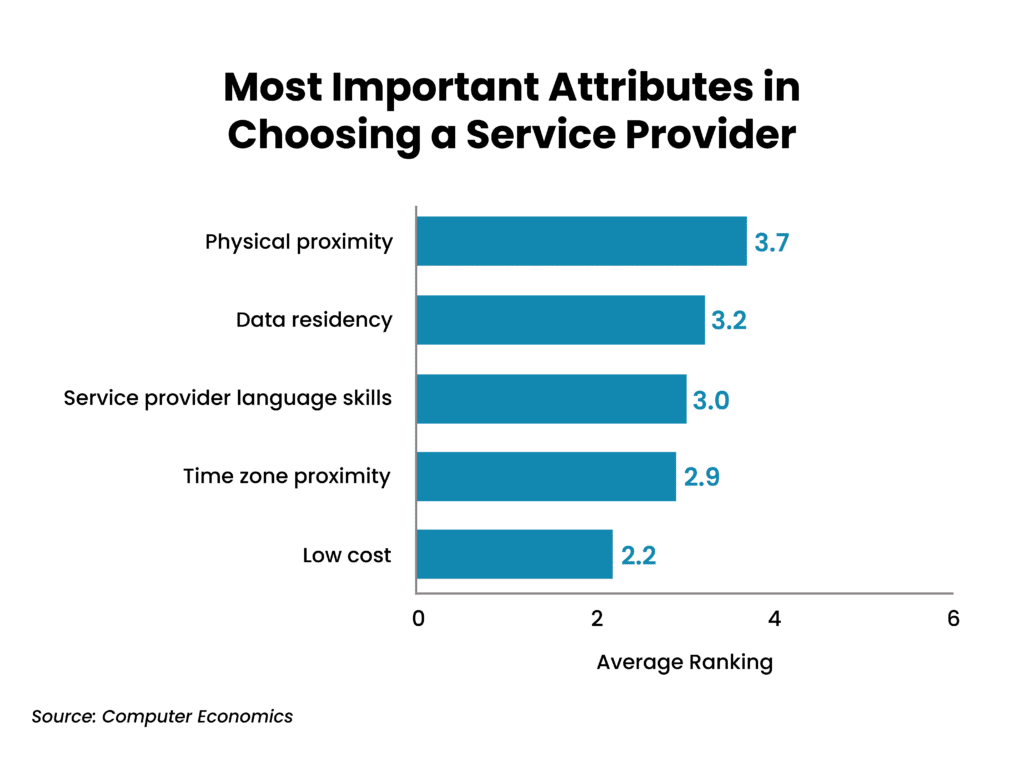In brief:
- 73% of restaurant operators say technology is critical to their ability to meet their objectives, but restaurants face unique challenges that leave many struggling to achieve reliable, cost-effective IT support.
- Stores can lose as much as $855 per hour when a POS device goes down – and impacts on customer satisfaction and loyalty can be greater.
- IT support partners play a critical role in ensuring seamless operations and customer experiences, but providers without experience navigating complexities in the restaurant setting can struggle.
- Five key qualities define effective restaurant IT services providers.
Restaurant brands are spending more on IT today than ever before as they seek technology solutions for operational challenges such as rising food and labor costs, shifts in consumer preferences, maintaining consistency across locations, etc. Restaurant operators have doubled their IT budgets in recent years – now accounting for 7-10% of their revenue, BofA Global Research found.
In this environment, 73% of restaurant operators consider technology to be “critical” or “very important” to their operation’s ability to meet key objectives, according to Nation’s Restaurant News’ (NRN) 2024 Restaurant Technology Outlook. Yet, most restaurant brands struggle to achieve consistent and cost-effective management of in-store IT technology for a range of reasons – high staff turnover, rapid growth in restaurant technology solutions, lack of technical expertise, absence of equipment standardization, budget constraints due to tight margins, etc.
Restaurants need IT support partners who can meet their unique needs and help overcome their challenges cost-effectively, enabling them to provide a consistent experience to customers.
Nearshore vs. Offshore: Navigating the Hidden Hassles of Outsourcing to Asia

What to look for in your restaurant IT support team
Given the critical importance of restaurant IT for providing seamless customer experiences, here are five key qualities your IT support provider must possess to successfully support your restaurant’s technology tools and locations:
1. Scale and expertise to support multi-location models
Restaurant brands, particularly those in the quick service restaurant (QSR) segment, can have hundreds or thousands of locations across different regions and countries. This challenges IT support – different stores within a restaurant brand may have different configurations, equipment models, and technology setups for their IT infrastructure. They also may face varying network conditions and differing levels of technical proficiency among staff.
Franchisee-owned stores add an additional layer of complexity. Franchise owners typically make varying levels of investment in their IT infrastructure, leading to differences in hardware, software, and network configurations across locations. They also may use different point-of-sale (POS) systems, inventory management tools, connectivity carriers and other software – requiring IT support to be proficient in multiple platforms.
Triaging IT issues quickly becomes challenging in this non-standardized environment – and IT providers who lack experience with multi-location business models often struggle to deliver strong results.
Quality partners bring proven processes, a deep talent bench, and best practices for executing a well-structured IT support strategy that can scale across thousands of locations, working effectively across corporate headquarters and corporate-owned and franchised stores. That should include:
- A robust IT support framework with well-documented processes for handling diverse user needs and challenges
- Standardized processes and a flexible approach that can scale up and down to meet changing demand
- Comprehensive documentation and training programs for support staff
- Deep familiarity with diverse restaurant systems
- Multiple communication channels and troubleshooting methods to speed up access and resolution while supporting users with varying levels of tech proficiency
2. Knowledge of restaurant-specific technology that enables speedy issue resolution
Besides needing the knowledge and scale to support multiple stores and geographies, providers also must be able to navigate additional restaurant-specific challenges that complicate IT support. A generalized outsourcer offering help desk agents at a low per-ticket rate is not enough to achieve quality restaurant IT support.
HappySignals’ 2023 Global IT Experience Benchmark report found that even though end users in restaurants and retail lean more heavily on IT than other industries, most express dissatisfaction with their current support model – losing an average of 3 hours and 12 minutes of working time during IT incidents.
Restaurant brands require IT partners with deep experience navigating the intricacies of the restaurant business – bringing the tools, knowledge, and strategies to resolve technology issues effectively through prompt triaging, remote troubleshooting, proactive identification of problems, performance reporting that drives continuous improvement, and more.
Restaurants need IT systems to handle rapid and high-volume transactions efficiently, as any downtime during peak periods can significantly impact both revenue and customer experiences. While impact varies based on store size and volume, industry reports show that stores lose approximately $855 per hour when a POS device goes down in a single store.
Solving issues in real time requires expertise in industry-leading restaurant technology tools, including leading payment processing and POS systems such as Square, Toast, Aloha, etc. This is also essential for your IT support provider to be able to go beyond resolving Level 1 help desk issues to provide effective POS management and administration support, handling complex support tasks and providing guidance on POS software features for effective menu management, troubleshooting assistance, and more.
Restaurant IT support must be able to accommodate users with varying needs and levels of tech proficiency as well. Service desk callers may range from high school student employees at stores to veteran franchise owners to corporate staff.
Read our case study to learn how Auxis leveraged its industry expertise and highly skilled nearshore resources to transform IT support and POS administration for a leading multi-brand QSR operator with 4,000+ stores – achieving a 96% SLA for incident resolution for all seven brands, reducing escalations to the client’s in-house team by 10%, and reducing operational costs by 30%.
3. Real-time, multilingual end-user support
Persistent IT labor shortages over the last few years have exponentially driven up costs for hiring and training tech employees in the U.S. – particularly for help desk services. Restaurant brand leaders cite lack of knowledge about new systems (32%) and lack of staff for managing and integrating new technology (29%) as key obstacles to building their technology stack, according to NRN’s 2024 Restaurant Technology Outlook report.
Increasingly, restaurants are turning to outsourcing to solve these challenges. But not every IT outsourcing solution is created equal.
Physical proximity ranks as the #1 factor for choosing an IT outsourcing provider, according to the 2023 IT Outsourcing Statistics report by Computer Economics – even if a lower cost could be realized in a more distant location.

Faraway time zones can make a tremendous difference when urgency or collaboration matters, with Asia-based offshore teams sometimes taking more than 24 hours to fix an issue. Requiring them to provide real-time communication doesn’t necessarily fix the problem, as most struggle to hire and retain high-level “A team” IT resources for overnight shifts that match U.S. business hours – increasing quality concerns and labor costs.
With shared or similar time zones, quality nearshore IT providers located in Latin America’s top tech markets solve these headaches – enabling real-time communication and in-sync work schedules that are essential to effective delivery of IT support.
LATAM boasts deep pools of highly educated resources with the critical-thinking skills and certifications to deliver advanced tiers of IT work for a significantly lower cost than hiring similar resources in the U.S. Lower turnover translates to consistent IT performance.
Latin America’s multilingual nature is also key to restaurant IT support. By combining strong English fluency with the ability to easily service the large percentage of Spanish-speaking employees at stores, nearshore providers ensure issues are communicated accurately to every user and instructions for achieving speedy resolution are clear.
Latin America further offers robust multilingual capabilities, supporting global store locations with service in French, Portuguese, German, Italian, Russian, Thai, Japanese, Arabic, and more.
4. AI and automation for rapid issue resolution and better user satisfaction
Automation capabilities are key to building a proactive, high-performance service desk, moving away from the traditional “break-fix” approach and upscaling end-user experiences with better processes, governance, and efficiency. However, barriers exist for organizations to be able to leverage intelligent automation successfully. Respondents to a 2023 ITSM.tools survey ranked the lack of skilled staff in-house as the biggest challenge for adopting AI in IT service management.
To effectively support your IT department, the right partner brings the resources, best-in-class tools, and process optimization strategies to embed AI-led automation into a restaurant’s IT service desk – improving response times, prioritizing tickets to ensure timely support, streamlining routine tasks, and identifying and resolving recurring issues without human intervention.
This includes prioritizing the creation of a self-service portal with an automated knowledge base that allows restaurant staff to solve common IT issues independently. Script-based chatbots can answer frequently asked questions, guide users through troubleshooting processes, provide status updates, and manage simple tasks like password resets without manual intervention.
AI can forecast potential IT infrastructure issues at stores as well, preventing costly downtime and service interruptions by enabling proactive support.
5. Extended coverage for global restaurant operations
Having comprehensive shift coverage for IT support is critical for restaurant brands, resolving urgent issues such as POS system failures or online ordering problems without delay. Quality restaurant IT providers extend help desk coverage to include 18×7 support, ensuring issues are addressed during night and weekend hours.
Effective nearshore providers also have the scale and quality of talent to accommodate global QSR brands operating in distant time zones, which require overnight help desk coverage. Latin America’s less-saturated labor markets, when compared to Asia, make it easier to hire and retain quality resources for overnight shifts.
An experienced IT support partner helps you determine optimal coverage levels based on your business hours, peak times, and geographic distribution – ensuring smooth and efficient operations while keeping cost overheads down.
The future of restaurant support = IT + operations in a single model
Restaurant workers typically need to contact different vendor helplines to resolve IT and operational issues, such as malfunctioning POS systems, network connectivity issues, missing supply orders, and questions about marketing promotions – leading to confusion, frustration, and delayed resolution. As a restaurant brand grows and adds new locations, the complexity of managing this burgeoning vendor base can make it difficult to maintain consistent and efficient support.
Unified care models are gaining traction in the restaurant industry, with exceptional restaurant support partners extending beyond IT support to deliver a single, convenient touchpoint for seamlessly resolving all issues across stores. By providing a unified view of tickets, their status, and issue resolution timelines, etc., they can save store staff valuable time figuring out the right source for everything from IT problems to operational issues and focus on what matters: serving customers.
Leading QSR brands rely on Auxis for comprehensive technical and operational support tailored to the unique needs of the restaurant industry. Recognized annually as a top outsourcing provider on IAOP’s Outsourcing Global 100 list, we leverage top-quality, cost-effective IT and customer support talent from our nearshore delivery centers in Latin America’s top hubs to help stores resolve issues quickly and effectively.
Our comprehensive service desk solutions are aimed at improving IT performance and identifying issues before they impact your stores. Through best practices and cutting-edge technology like AI-powered automation, we go beyond troubleshooting to deliver an end-to-end suite of innovative IT services, franchisee care, and customer support that ensure a unified brand experience for our customers.
Schedule a consultation with our IT Restaurant Services experts today! Or, check out our restaurant industry success stories. To learn more about other restaurant industry services Auxis provides – including virtual audit and brand protection services – click here.





